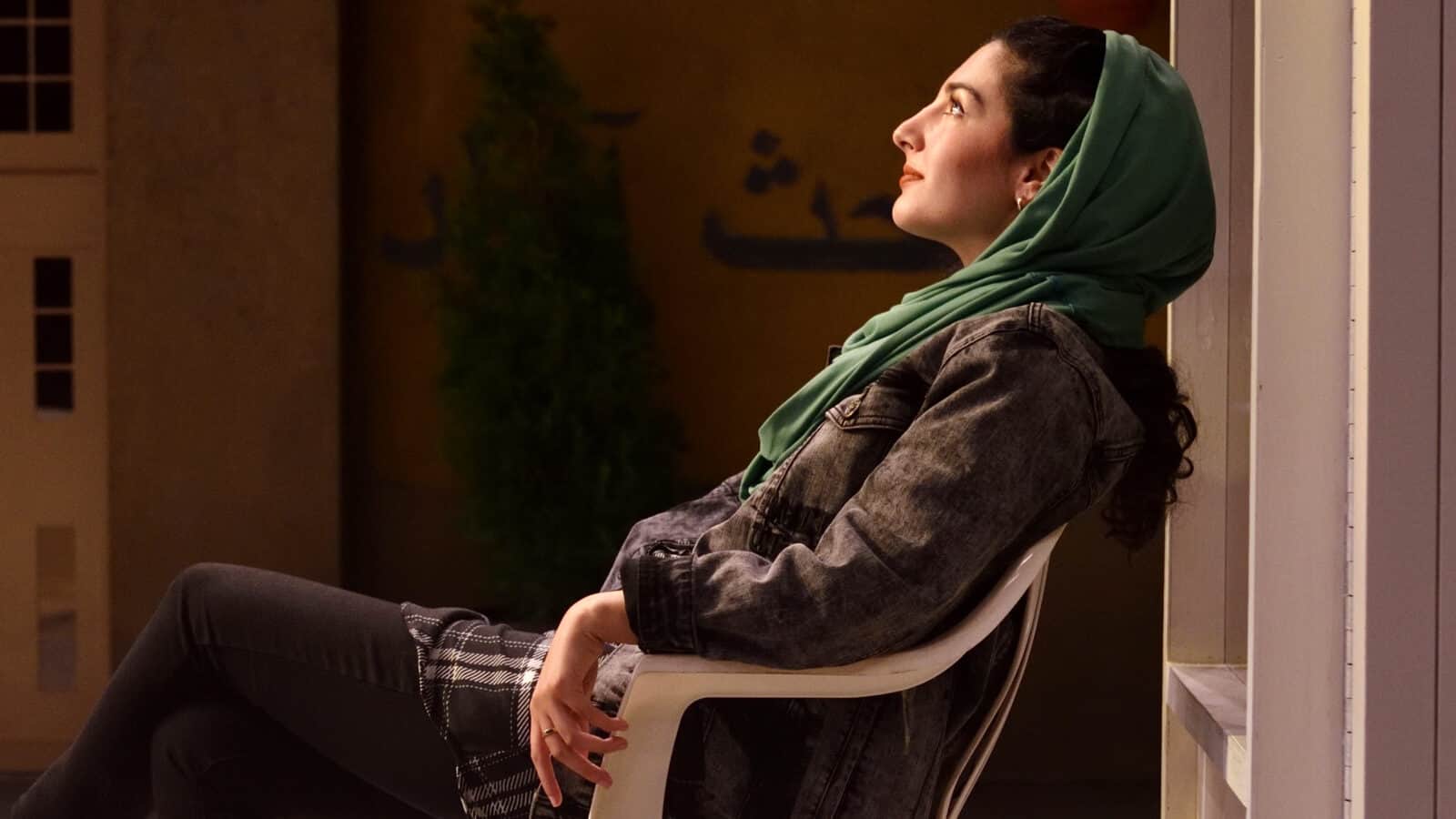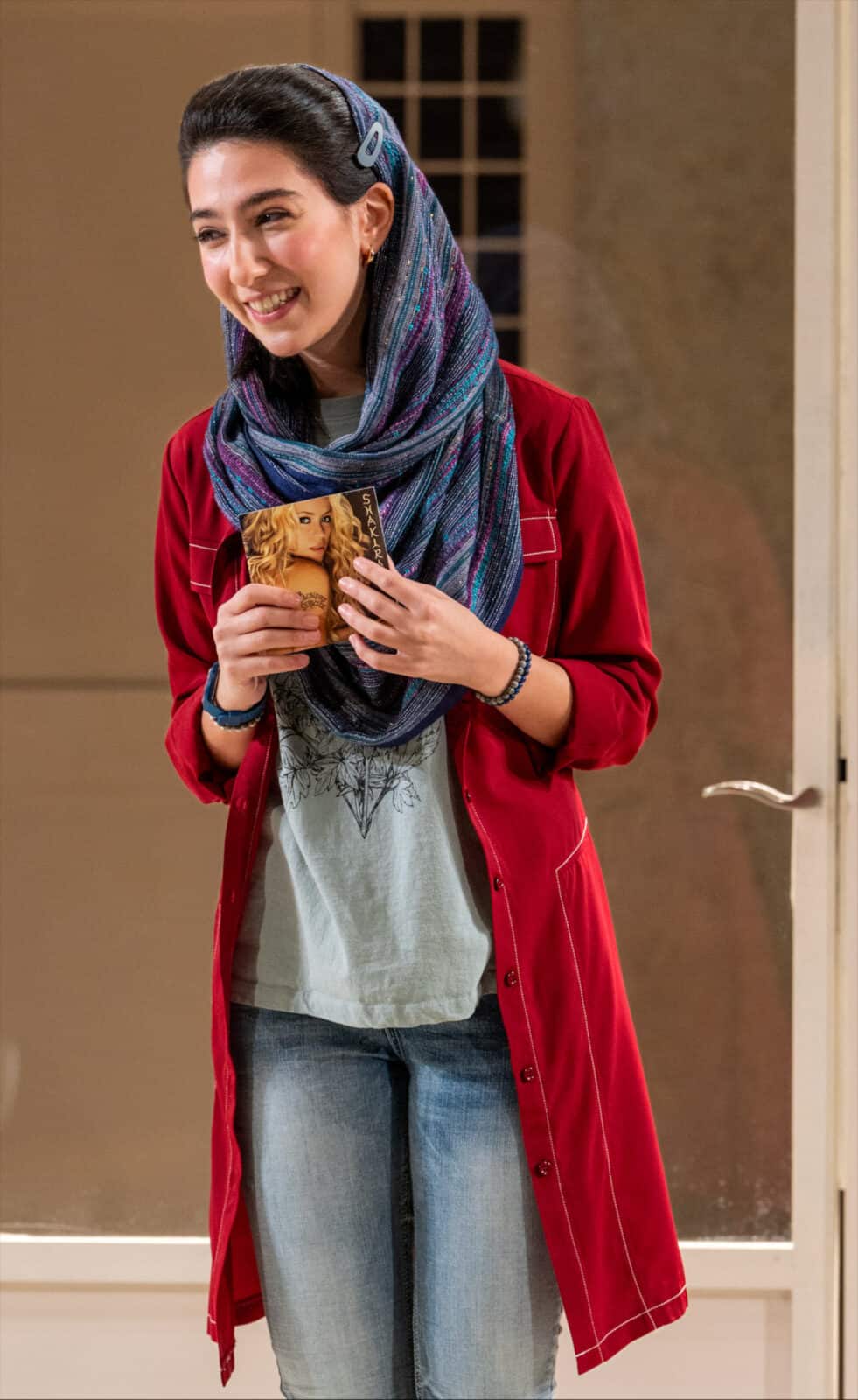Four students walk into a classroom in a city in the mountains. Tonight they’ve come to talk about how it feels to learn a new language.
They may share the music they’re listening to on their iPhones — a pop song with a backbeat, or Shervin Hajipour singing in a warm tenor, ‘because of dancing in the street … because of my sister, your sister, our sister … because of a smiling face, because of students for the future …’
As they walk onstage, they are crossing time and space to Karaj, Iran, in 2008. Elham and Goli, Roya and Omid, and their teacher, Marjan, live in city of more than a million people — near Tehran and the Caspian sea, Karaj is a center of contemporary life, home to people from many parts of the world and to national universities — a meetingplace of ideas and global connections for more than 2000 years.
And they are here tonight, as English by Sanaz Toossi, winner of the 2023 Pulitzer Prize, opens at Barrington Stage. Toossi has come to the Berkshires from her home in California as both playwright and actor, to play a student, Elham.
‘We learn … to speak not only our needs but our wants. To speak our souls. To speak. And to listen. To the insides of others.’ — Nazanin Nour as Marjan
She joins Narges Kalogli as Goli, Pooya Mohseni as Roya and Babak Tafti as Omid — an 18-year-old woman with her future open, a mother in her 40s missing her son, a man and a woman in their late 20s or 30s shaping foundations in their lives. As the play opens, they come together to learn English with Nazanin Nour as Marjan.
Dreaming the future
As students, they all come in different places in their lives, said director Knud Adams, speaking before a rehearsal on a sunny fall day in Pittsfield — and for all of them, the stakes in learning can be high.
Elham and Goli, Roya and Omid have come to prepare for the Test of English as a Foreign Language (TOEFL) proficiency exam. The test is immensely difficult, Knud says, and each of the students in the play has their own reasons for taking it — reasons that can shape their futures.
In 2008, English is a language of international travel Adams said, and speaking the language can make a difference in they choices they have, to protect and care for their families and themselves.
Adams respects the depth of the challenge. His mother teaches English as a second language, he said, and as he immerses in the play, he recalls the stories he has heard from her. Her students’ experiences can encompass their loved ones, their home and country and culture, their work, their loves and dreams.
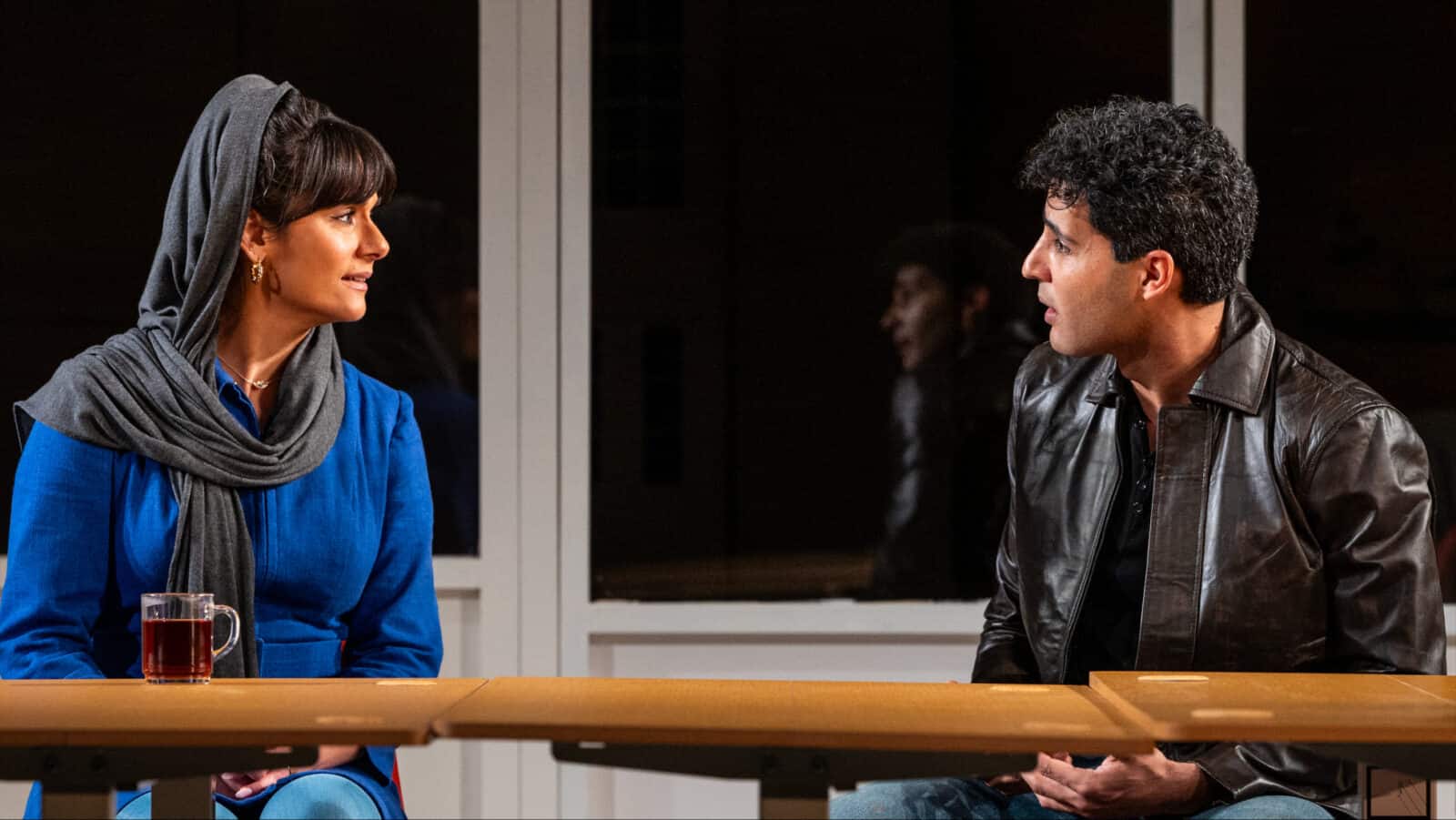
Nazanin Nour as the teacher, Marjan, talks with Babak Tafti as Omid, a student in her office hours in a city classroom at night, in Sanaz Toossi's play 'English' at Barrington stage. Press photo courtesy of BSC
Honoring home
Toossi’s characters hold these tensions with subtle depth and intensity, Adams says. Learning language is intimate by nature, from childhood, growing connection and relationship and understanding.
“We learn … to speak not only our needs but our wants,” Marjan says. “To speak our souls. To speak. And to listen. To the insides of others.”
Goli at 18 speaks warmly and closely of her own native tongue — ‘English does not want to be poetry like Farsi.’
Kalogli, who plays Goli, grew up in Iran, Adams said, and Farsi is very much her first language. In rehearsal, she speaks of the richness in her country’s language and literature.
‘The language in which you think and dream, even the grammar and construction of sentences, can inform how you perceive the world.’ — Director Knud Adams
Farsi has a long and deep and innate history of poetry, he said — from Persian classics, the Sufi scholar and mystic Rumi, and Hafiz “rising up like a thousand suns out of the mouth of a single bird,” to contemporary voices like Forugh Farrokhzad who have made themselves heard around the world.
Goli finds supple beauty in their voices and the voices of people she loves, and at 18, she has a sense that language not only expresses what she thinks, it can form and influence how she thinks.
“The language in which you think and dream, even the grammar and construction of sentences, can inform how you perceive the world,” Adams said.
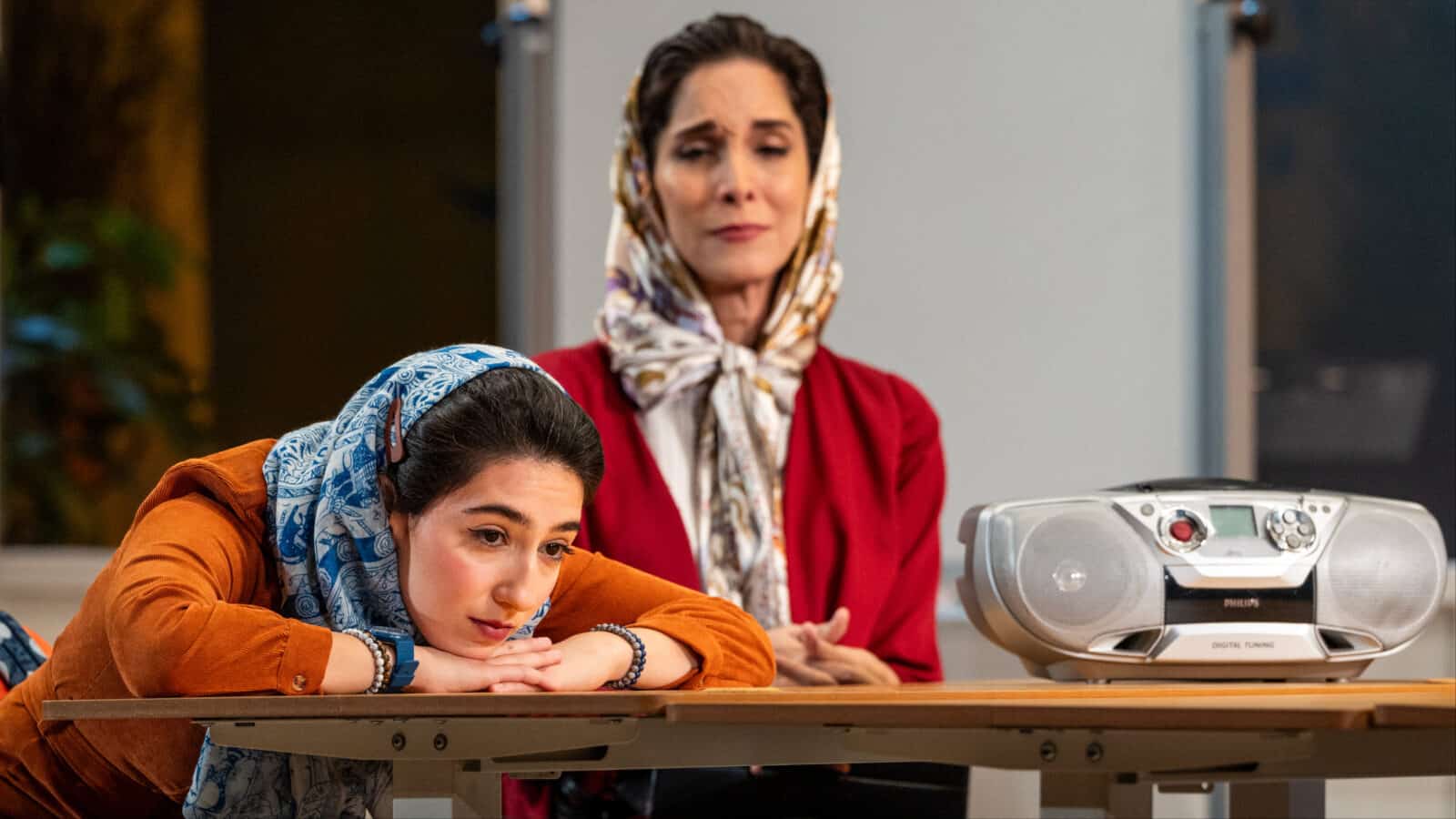
Pooya Mohseni as Roya looks on with kindness and humor as Narges Kalogli rests her chin on her hands and her head on a classroom table as Goli, a student in Iran, in Sanaz Toossi's play 'English' at Barrington stage. Press photo courtesy of BSC
Lost in translation
Taking on another way of seeing can feel enlivening and empowering, and it can feel awkward, even shaming, Adams said. “As we’ve all experienced, learning can be eye-opening” — freeing and challenging.
And in this class the students are carrying greater weight. As they learn, he said, some see English as an opportunity, and some a rejection of their own culture and identity.
Elham has come for her dreams and ambitions — she has a place in medical school in Australia. Goli has chosen to learn for herself, because English as a language intrigues her. Roya wants to learn her family, to keep relationships with her son and granddaughter who now live in Canada.
‘Omid has a dream, a fantasy — what if being bilingual and bicultural could be an expansion — what if people had the freedom to stretch in mind and body, pursue opportunities, explore two worlds and not have to choose between them?’ — Knud Adams
And Omid has vital choices to make — he is trying to decide whether to stay in Iran or make life in another country.
For a man living between two worlds, like Omid, knowing more than one language can be a gift, Adams said, and as someone who moved around internationally when he was young, he can sympathize.
Omid has a dream, a fantasy, he said — what if being bilingual and bicultural could be an expansion — what if people had the freedom to stretch in mind and body, pursue opportunities, explore two worlds and not have to choose between them?
“Do you ever think about who you would be,” Omid asks, “if you never had to think about staying or leaving?”
But Omid and his classmates do feel a need to choose. For many of them, knowing English may mean leaving home. They are living in a time when people are leaving Iran, Adams said, and that movement can be a source of pain.
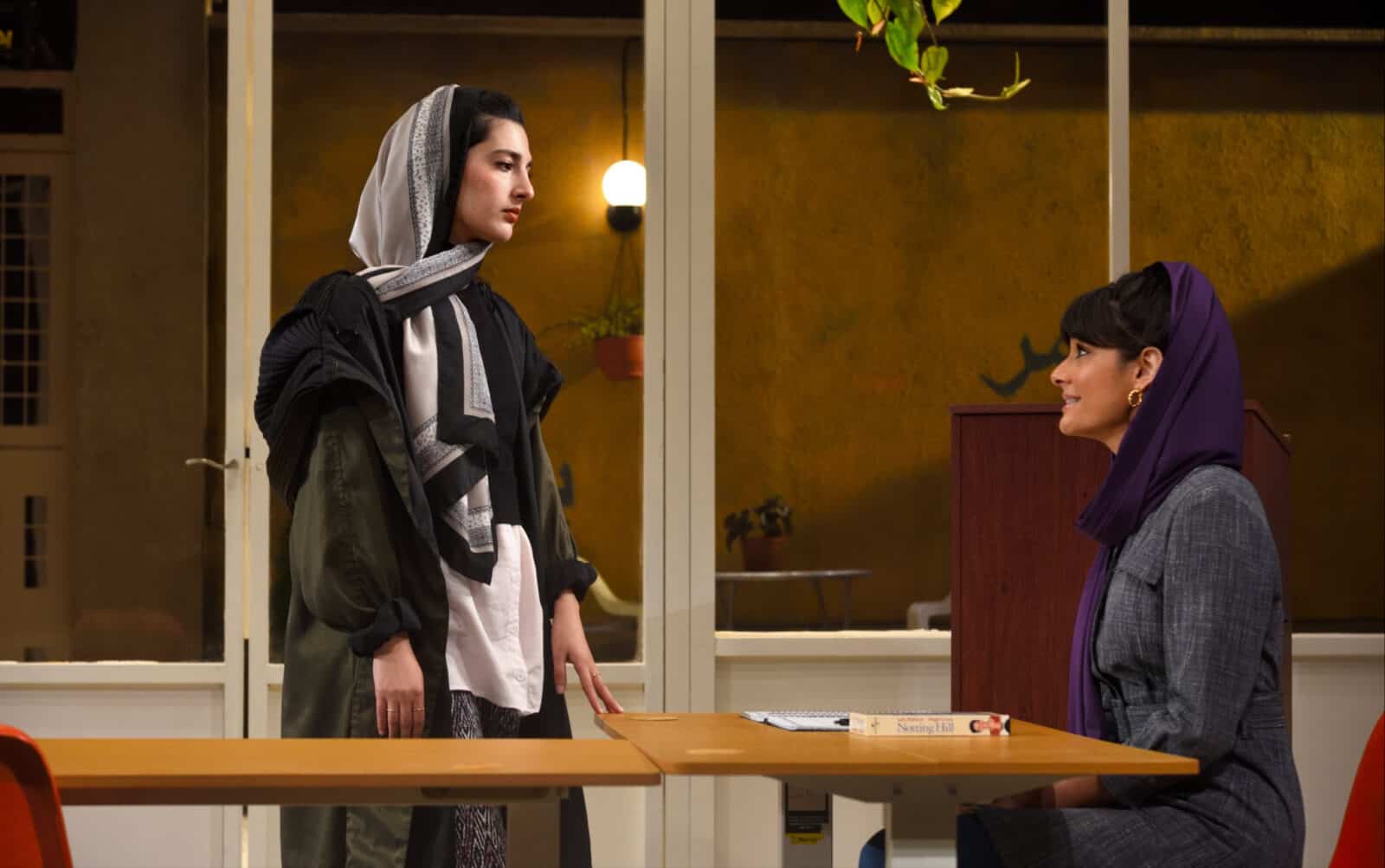
Sanaz Toossi, playwright and actor, speaks as Elham, a student holding eye contact with her teacher, Nazanin Nour as Marjan, in Toossi's nationally awardwinning play 'English' at Barrington stage. Press photo courtesy of BSC
The dilemma of diaspora
Roya, speaking carefully in English and fluidly in Farsi, compares her son’s voice in his messages on her phone, when he calls her from across the ocean.
“Do you hear how much more soft he is in his mother tongue? Do you hear he remembers where he is from and who he comes from? He forget in English, but in Farsi he remember.”
Adams sympathizes with her struggle. In the past decades, he said, unrest and the West’s interference in Iran, the Islamic revolution, have divided families. English-speaking countries, or their governments, have played a role in the past and present that have brought Iran to this point.
“To feel that you have to learn this language in order to connect with your family, or to study, or to work,” he said — “to feel that completion of it is your obstacle in central parts of your life … how could you not resent it?”
Conflicts rise as the students become vulnerable, and Marjan has to navigate between them.
“I understand,” she tells them, “how strange it feels to invite a foreign language into your body. …”
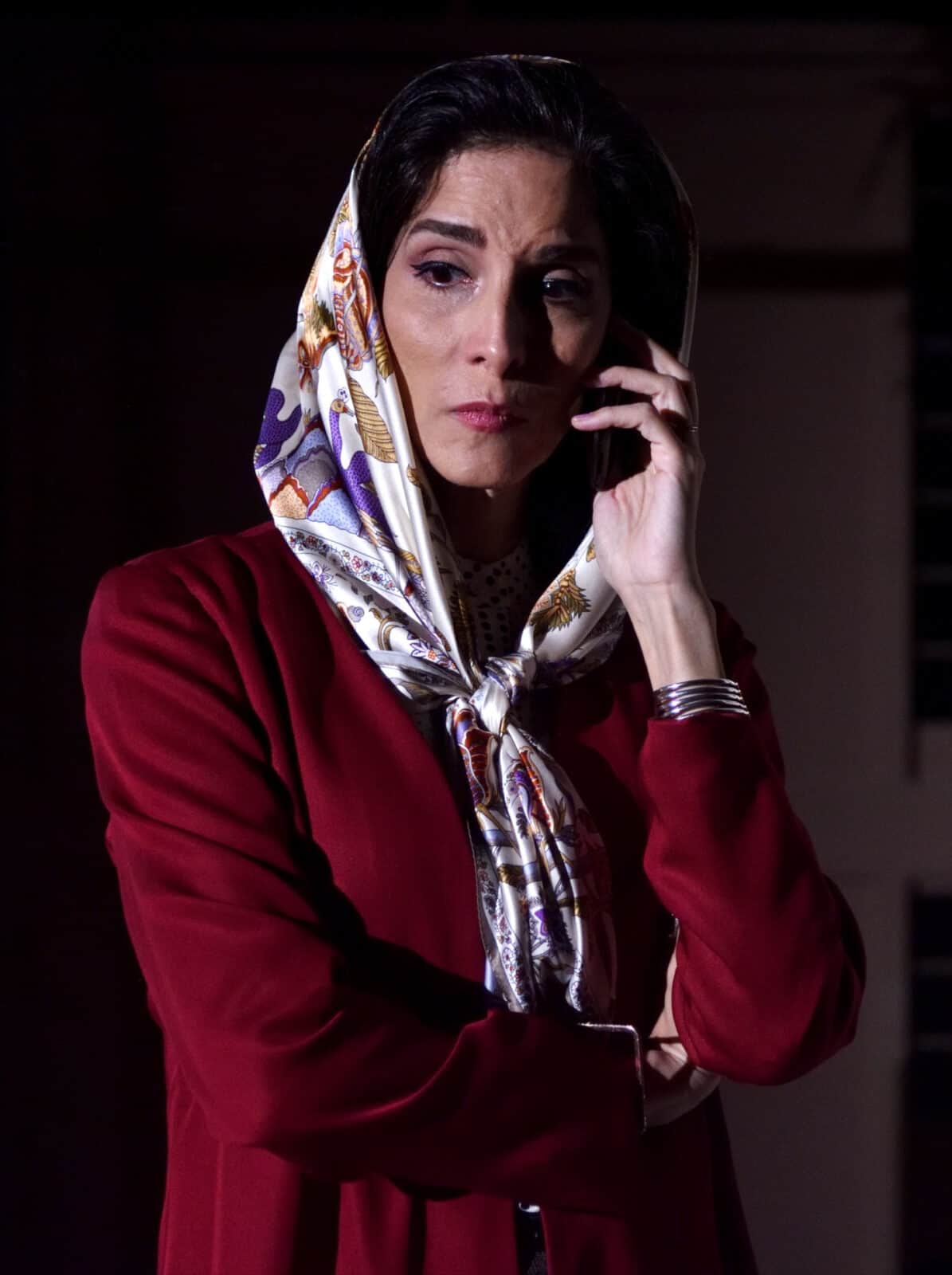
Pooya Mohseni as Roya holds her smartphone, looking sad as she tries to reach her grown son — she is learning English in Iran, in Sanaz Toossi's play 'English' at Barrington stage. Press photo courtesy of BSC
Speaking for freedom
She and all her class are living in a time of change in Iran. Toossi has set the play on the precipice of the Green Revolution, Adams said. Within the year in these students’ lives, millions of people in Iran would be protesting for democracy and civil rights — many of them young and urban, students, women, raising their voices to call out ‘Where is my vote?’
“It’s stunning for us in this country,” Adams said, “even to imagine the participation of the population in an uprising … the number of people marching in the streets, protesting a fascist regime, interfering with an election, speaking to what the country wants for itself.”
The protests continued for six months, until the government suppressed protesters violently, and Adams sees their reverberations still in the protests in the past year, as women in Iran have been protesting for women’s rights, at the same time as women have been protesting across the U.S. for their own.
Protests swept Iran a year ago in September, when an Iranian Kurdish women, Mahsa (Jina) Amini, was arrested, reportedly for wearing her hijab too loosely, and died in the custody of Iran’s morality police. Thousands of women led protests openly for some ten months, speaking out against censorship and violence, and calling for their rights to education, to choice over their own minds and bodies, and many people stood with them. Tens of thousands of protestors were arrested; hundreds died.
As the 2016 election has reminded this country, Adams said, a people are not their government. What a country’s leader declares — what the world outside a country sees — may look very little like what people living there see and believe and experience.
He finds Toossi’s perspective vital and fresh. For some people seeing the play, he said, this may be their first time understanding the daily lives of Iranian people, and there are many who don’t feel represented by their government, though they may have warm and living relationships with their homes and families and their country’s history and culture.
Finding a voice
Those who have left home, by choice or not, may carry those relationships with them — as they carry the courage of students learning a new world.
Thinking of Omid, and of Roya’s granddaughter in Canada, Adams thinks of his mother and the immigrant families she has worked with, as they make choices for their families, trying to help their children grow.
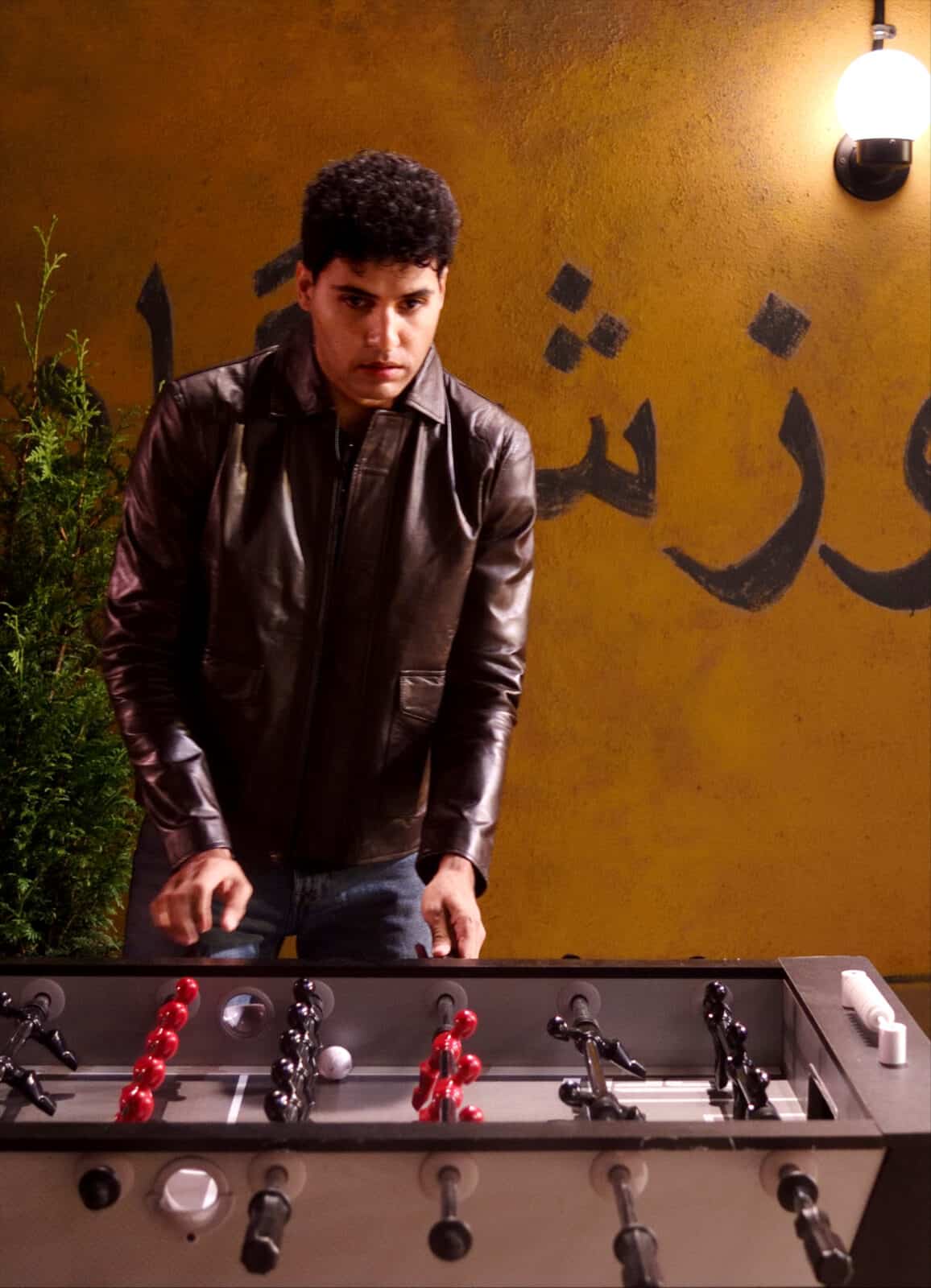
Babak Tafti as Omid plays foosball (table soccer) while he waits for his teacher's office hours in Sanaz Toossi's play 'English' at Barrington stage. Press photo courtesy of BSC
“As an ESL specialist teaching high school students,” he said, “she talks about the work beyond the language that you have to do when you are trying to help families who have just moved here and are navigating a new country for the first time. They are dealing with larger structures … and helping a student to write an English essay can be the least of your worries.
“You want to give empathy and advocate for what’s best for them. You have to listen — you have to understand where their priorities lie and not impose your own — and it’s a tremendous amount of work and heartbreak.”
Marjan understands that struggle first-hand. She has lived in England, and the play subtly hints at her complicated relationship to that time.
She came to the UK in her 20s, Adams said, in a time for her of youth and possibility, opportunity and personal freedom. In some ways she looks back warmly, and in other ways she recalls a sense of and isolation in making her way in another country.
Still in some ways she finds English compelling enough to bring her back to the classroom years later … to help her students to define for themselves a sense of identity and pride in many ways.
Elham says she likes herself when she speaks Farsi — she feels more rounded, kinder, deeper, more nuanced. Goli hears new intonations in her voice in English. For her English has a bluntness and confidence that feels liberating, Adams said
Marjan can offer hope of encompassing both.
“I’m here with you today,” she says, “because I want you to hear your voice and fall in love with what it becomes.”

